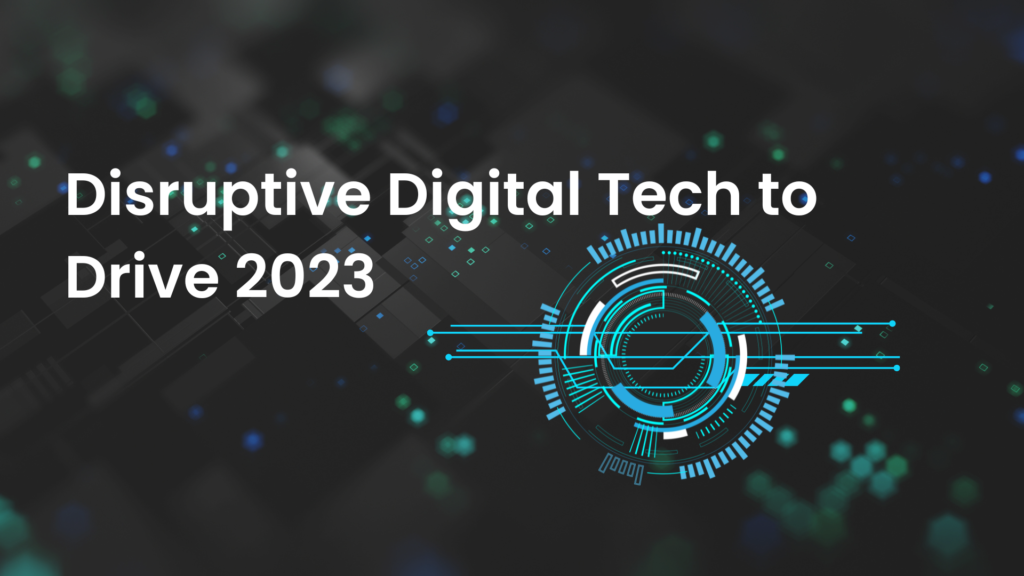CXO
UPDATES
Disruptive Digital Tech to Drive 2023
Digital technology has been disrupting industries for the past few years, and 2023 promises to be no different. With technological advancements happening at an unprecedented pace, businesses that do not embrace digital transformation may find themselves left behind. In this blog, we will discuss some of the disruptive digital technologies that are set to drive 2023.

1. Artificial Intelligence (AI)
Artificial Intelligence is one of the most disruptive digital technologies that has already been transforming businesses across multiple industries. In 2023, we can expect AI to continue to be a game-changer, with more companies adopting it to automate repetitive tasks and make data-driven decisions. AI-powered chatbots, virtual assistants, and personalized product recommendations are just some of the many ways AI is set to transform businesses in 2023.
2.Internet of Things (IoT)
The Internet of Things is another disruptive digital technology that is set to drive 2023. IoT refers to the interconnectedness of devices, objects, and sensors that can collect and exchange data with each other. In 2023, we can expect IoT to be used to optimize supply chains, automate logistics, and improve customer experience. Smart homes, self-driving cars, and wearables are some of the many examples of IoT in action.
3. Blockchain
Blockchain technology, which allows for secure and transparent record-keeping, is set to disrupt multiple industries in 2023. In the financial industry, blockchain is already being used to facilitate faster, more secure transactions. In other industries, such as healthcare and supply chain management, blockchain can be used to create more transparent and efficient processes. In 2023, we can expect to see more companies adopting blockchain technology to improve their operations.
4. Augmented Reality (AR)
Augmented Reality is a technology that overlays digital information onto the physical world, allowing users to experience a new type of reality. In 2023, we can expect AR to be used in a variety of ways, from enhancing product demos to providing immersive experiences for customers. AR can also be used to create more efficient training programs for employees.
5. 5G
The rollout of 5G technology is set to revolutionize the way we use mobile devices and connect to the internet. With 5G, we can expect faster download and upload speeds, more reliable connections, and the ability to connect more devices simultaneously. In 2023, we can expect to see more businesses adopting 5G technology to create new products and services that leverage the faster speeds and connectivity.
In conclusion, 2023 promises to be an exciting year for digital technology. Businesses that embrace the disruptive technologies listed above will have a competitive advantage over those that do not. Whether it’s AI, IoT, blockchain, AR, or 5G, companies that incorporate these technologies into their operations will be better equipped to meet the demands of the digital age.
According to a recent survey by McKinsey, top CEOs have identified high inflation and economic downturn as trends to watch out for in 2023, while also recognizing the potential of disruptive digital technologies as a game-changer. When asked about specific action points to address these challenges, the CEOs suggested a combination of defensive and offensive strategies as an effective playbook for leaders in 2023.
In terms of digital technology transformations, the CEOs identified advanced analytics, cybersecurity enhancement, and workplace automation as key areas that should be included in any CEO playbook going forward. The introduction of advanced analytics tools like ChatGPT was seen as a potential competitive advantage by 62% of the CEOs surveyed, with companies like Diageo and Sun Life already using predictive analytics to personalize their customer experience.
In addition, 48% of CEOs felt that companies should follow the example of JP Morgan Chase, which has invested heavily in cybersecurity-related changes such as infrastructure modernization and employee training. The CEOs also recognized the cost-saving benefits of automation, with 45% believing that automatic work would continue regardless of layoffs.
To weather the economic downturn in 2023, the CEOs emphasized the importance of early action to lower costs and protect balance sheets. 76% of respondents felt reducing operating expenses was crucial, with the tech industry shedding jobs while others looked to supply chain renegotiations, tax optimization, and tightening expense policies.
Redesigning products and services was seen as another key aspect of the CEO playbook, with 61% of CEOs feeling it was necessary to attract and retain customers. The CEOs also recognized the need to reassess strategic and economic assumptions on an ongoing basis, stay agile and adaptable, and invest in compliance and resilience capabilities to mitigate geopolitical risks.